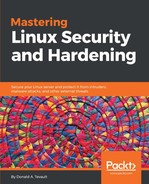As useful as it may be to have SUID or SGID permissions on your executable files, we should consider it as just a necessary evil. While having SUID or SGID set on certain operating system files is essential to the proper operation of your Linux system, it becomes a security risk when users set SUID or SGID on other files. The problem is that, if intruders find an executable file that belongs to the root user and has the SUID bit set, they can use that to exploit the system. Before they leave, they might leave behind their own root-owned file with SUID set, which will allow them to easily gain entry into the system the next time. If the intruder's SUID file isn't found, the intruder will still have access, even if the original problem is fixed.
The numerical value for SUID is 4000, and for SGID it's 2000. To set SUID on a file, you'd just add 4000 to whichever permissions value that you would set otherwise. For example, if you have a file with a permissions value of 755, you'd set SUID by changing the permissions value to 4755. (This would give you read/write/execute for the user, read/execute for the group, and read/execute for others, with the SUID bit added on.)
